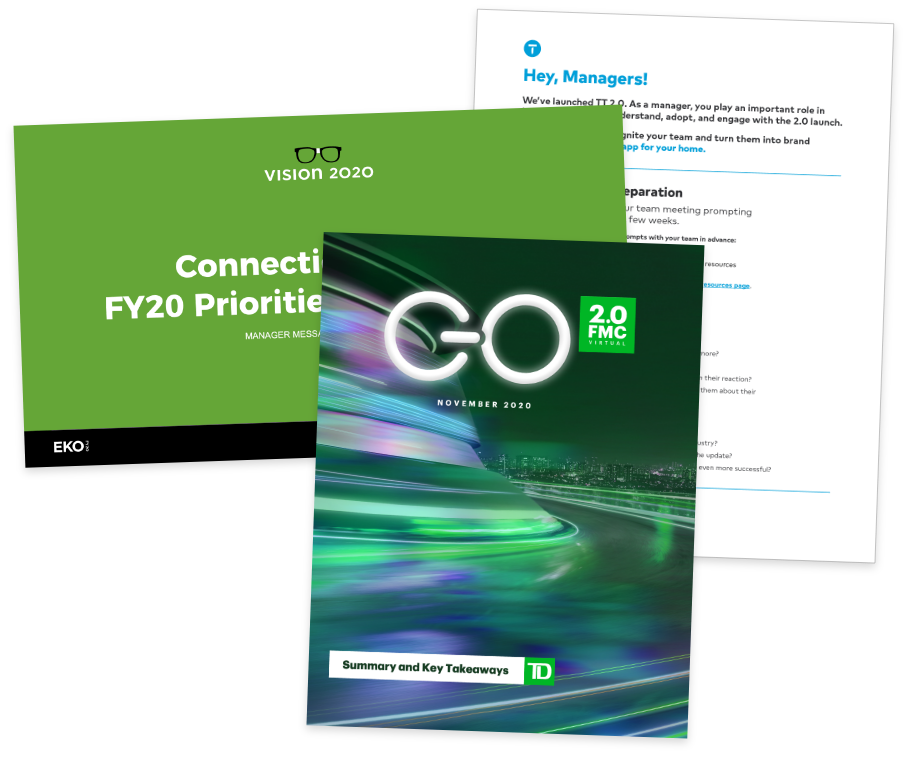
Employee Connections from
the Manager’s Perspective
Research Spotlight

Our latest research study uncovered several findings about employee connections at work. Among the highlights was the revelation that most employees are disconnected at work despite wanting to feel connected. We also found that the more connected employees become, the greater their trust, retention, and overall engagement at work.

This research spotlight discusses managers’ perspectives on creating employee connections at work. We’ll dive into new research findings and answer questions such as:
-
 Do managers think employee connections are important?
Do managers think employee connections are important?
-
 What challenges do managers face when promoting workplace connections?
What challenges do managers face when promoting workplace connections?
-
 How can the organization help managers connect with their direct reports?
How can the organization help managers connect with their direct reports?
We asked 400 full-time employees how they felt about their experiences at work in a 15-minute quantitative survey. The survey was conducted from June 15-19, 2023. All respondents work in organizations of 1,000+ employees and are at the level of VP or below. 219 of the 400 respondents are people managers with at least one direct report.
Overall margin of error of +/- 4.9 percentage points at 95% confidence level.
The attitudinal segmentation was exclusively based on ratings of attitudinal statements. Neither the number of segments nor their defining attitudes were predetermined. All resulted organically from a purely mathematical analysis. Each segment represents a group of respondents for whom a particular set of attitudes is strongly connected.
A visualization of the data is available here.

Managers Are Integral in Building and
Supporting Employee Connections
Employees with effective managers are
15.4
more likely to be
high performers
3.2
more likely to stay
with the organization1
1 Gartner
Managers are connectors — the conduit through
which company strategy and goals flow to employees.
So it’s no surprise managers also help employees
build connections with their work and team.
Clearly, employees benefit from managers who cultivate workplace connections. Our research revealed:
But how do managers feel about connection?



What Managers Think About
Workplace Connection
Our research revealed a lot about employee views on connection at
work. Here’s the manager’s perspective:


Key finding number 1:
Managers Agree
Connection Is
Important
Three out of four managers (76%) agree with employees that workplace connections are very or extremely important.
How important is it for you that your direct reports
feel connected to the organization?

“It is important that my direct reports feel connected to the organization because that is what creates the foundation of their experience moving forward.”
—Disconnected Manager and survey respondent*
*despite feeling disconnected, this manager still wants and values connection
Many factors contribute to employee connections, but managers and employees agree on the most important ones. Like employees, managers named communication, leadership, listening, empathy, and flexibility the most critical in helping them facilitate employee connections.
Which skills do you think managers most need to facilitate connection
between their direct reports and the organization?


Key finding number 2:
Managers Perceive
Several Obstacles to
Connection
Managers say they take many actions necessary for cultivating employee connections, such as recognizing employee contributions, communicating regularly, and supporting employee wellbeing.
Despite these efforts, managers feel many obstacles prevent
them from creating connected direct reports.
What challenges do you have in helping your direct
reports feel connected to your organization?


Key finding number 3:
Managers Want
More Support
Most managers (91%) feel the organization supports their efforts to improve employee connections at work.
Managers agree that they could do more if their companies offered:
Managers also say they want to improve their skills in promoting employee connections, and these things would help:
- Time in my schedule
- One-on-one time with my direct manager/supervisor
- Formal training from my organization
- Participating in a workshop
- Taking an online course
- Attending a seminar
- Working with a coach
- Attending a conference


Key finding number 4:
Connected and
Disconnected
Managers Have
Different Experiences
Connected Managers are more likely to say it’s very important they help their direct reports feel connected.
Managers report feeling more disconnected
(57%) than connected (43%).
Though most managers see the value of employee connections, a greater share of Connected Managers (88%) say helping their direct reports feel connected is very or extremely important, compared to just 68% of Disconnected Managers.
How effective are you in creating a sense of connection between
your direct reports and your organization?
- Connected Managers
- Disconnected Managers

“[Employee connection] boosts morale. I want the people who report to me to feel respected and appreciated. Money just gets people to work; it is not the most motivating factor.”
—Connected Manager and survey respondent
Similar to Disconnected Employees, Disconnected
Managers perceive more connection blockers.
Their employee experience is strikingly different from Connected Managers, suggesting they work in a culture where there is insufficient support for cultivating and maintaining employee connections.
Disconnected Managers aren’t just prone to seeing more obstacles to connection; they are likely experiencing these obstacles to a greater degree than Connected Managers. Of nearly all the options we provided, Disconnected Managers were more likely to cite them as obstacles to connection.
What challenges do you have in helping your direct
reports feel connected to your organization?
- Connected Managers
- Disconnected Managers
Since Disconnected Managers perceive so many connection challenges, it’s not surprising they also feel a lack of support from the organization. Only 43% of Disconnected Managers feel very or extremely supported by their organization in connection-building efforts, compared to 88% of Connected Managers.

To what extent do you feel supported by your organization to facilitate
connection between your direct reports and the organization?
- Connected Managers
- Disconnected Managers

How to Leverage Managers for
Deeper Employee Connections
Managers value workplace connections as much as employees, but they could use some help. Here’s what the organization can do to support managers and facilitate those connections:
Number 1: Help Managers Understand
What Drives Connection
The many paths to improving employee connection aren’t always obvious. Though surveyed managers cite connection blockers such as a lack of decision-making authority, leadership support, and company resources, it’s critical they understand these factors aren’t prerequisites for connection.


Instead, managers need to know they already possess the autonomy to build and maintain employee connections within their team. Starting immediately, managers can help employees feel more connected to their work, team, and the organization by taking these actions:
“[The] best thing is when my manager and I have our quarterly conversation on the progress of my personal and professional goals and how she can help get me there. It keeps me motivated on my long-term goals and I love the support she gives.”
—Connected Employee and survey respondent
Number 2: Help Managers
Understand Their Role
Everyone in the organization — employees, HR, senior leaders, and internal comms — can and should promote experiences and behaviors that improve employee connections. But managers play a special role. They impact employees’ day-to-day experiences and can provide employees with the communication, leadership, and flexibility they need.


Help managers recognize their role in promoting employee connections by:
“[Helping my direct reports feel connected] impacts me as a leader…. I wouldn’t be doing my job otherwise.”
—Disconnected Manager and survey respondent
Number 3: Recognize and Address
Connection Obstacles
Managers often wear many hats. They have individual responsibilities and also manage team goals and performance. This reality helps to explain why managers cited a lack of time and competing priorities as top obstacles to employee connections.


Organizations can identify and tackle barriers to connectivity and address these concerns by:
Number 4: Give Managers a Roadmap
Though managers recognize the importance of employee connections, and some are doing what it takes to make it happen, many others simply don’t know how. Organizations can help by introducing internal communication tools that clarify what managers can do to build a more connected team.


Guides, gamified apps, and other creative assets are examples of tools HR and internal communications teams can use to support managers and help them become more successful champions of employee connection.





Help Managers Drive
Employee Connections
Skilled and motivated managers promote meaningful employee connections that boost trust, belonging, and engagement. With additional assistance, managers can be even more effective in helping employees develop lasting connections.
Share this report

Stay tuned for more eye-opening
research findings!
Another supplemental report covering the role of total rewards in building employee connections is coming soon!
Follow us on LinkedIn to receive alerts for upcoming reports and tips to improve employee connections at work.

About Ingenuity Design
We’re an Employee Experience agency that strengthens companies from the inside out. We advise and create value-driven employee experiences across the employee lifecycle to help make companies great places to work. We’re proud to work/have worked with eBay, TD Bank, Splunk, Visa, Gap Inc, and Thumbtack, to name a few.
About Audience Audit
Audience Audit helps marketing agencies build ROI and reputation based on original thought leadership research. Founded in 2009, the firm has conducted audience research for hundreds of agencies and their clients.